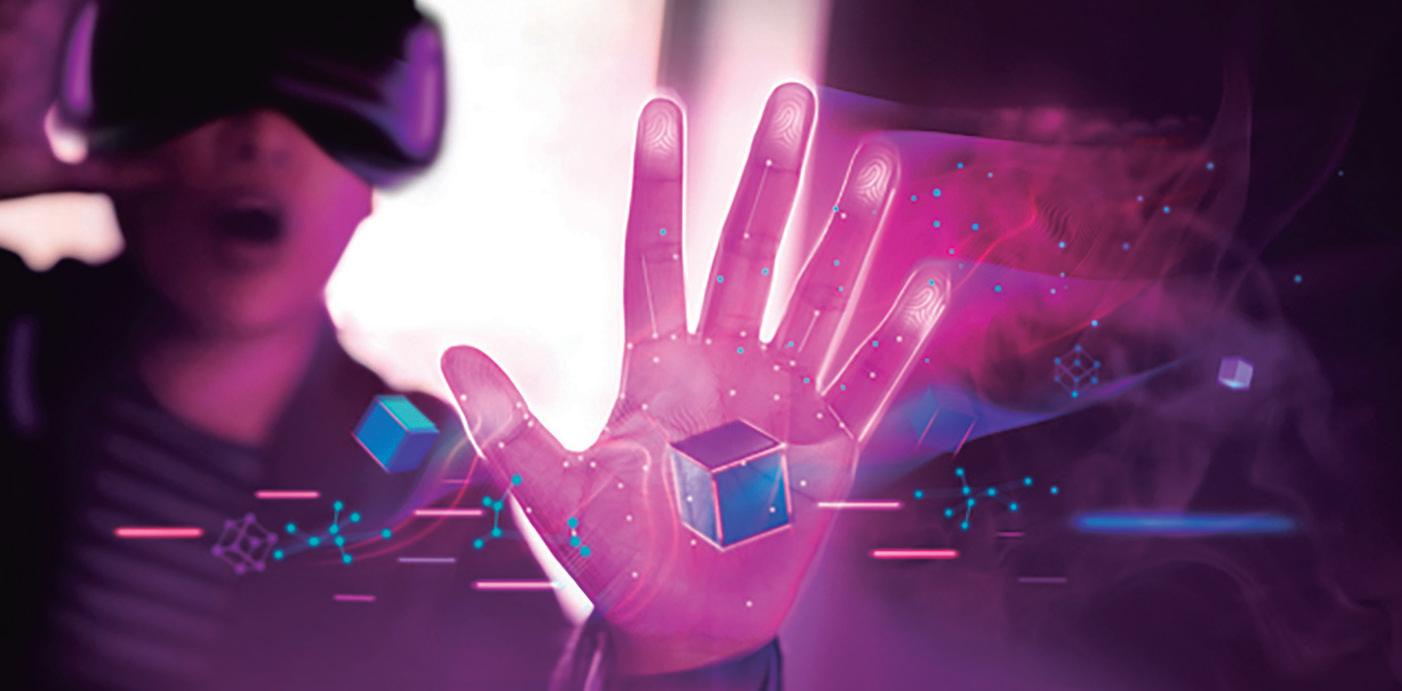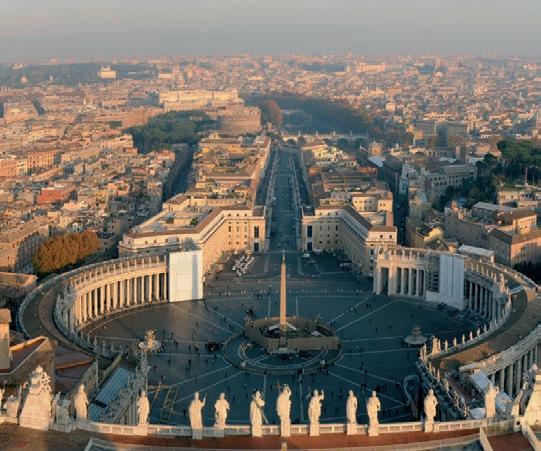
13 minute read
The Metaverse: What Is It? Will It Create a Virtual Hell on Earth?
BY JOHN HORVAT II
The next step in the cyberrevolution is the so-called metaverse, a powerful computing platform that goes beyond anything seen to date. It is marketed as the next generation of the Internet, facilitating intense experiences and opening new markets.
However, no one considers the moral implications of the project. No one asks what the Catholic position on this development should be and if the metaverse will harm souls. Tragically, people see no reason to involve God and morality in a technological invention seemingly outside the private realm of religion. Worst of all, many in the clergy show no sign of acknowledging the issue. It is not even on their radar.
However, the issue is important to the salvation of souls. The metaverse is a metaphysical attack on the Church’s worldview. It obliterates the nature of a God-created universe. It will make possible immoral acts that will gravely offend God. Catholics need to be concerned.

© Steveheap / Dreamstime.com
What is the Metaverse?
The metaverse is a new realm of fantasy and unrestraint. This next wave of innovation and technology will allow individuals to immerse themselves in a world of their own creation together with others. People will become avatars, that is, cyber-representations of men, women, animals or things that “live” in the cyber-sphere. They will be capable of being wherever they want—be it on the moon, on top of buildings or “in a field of unicorns.” This platform can be inhabited by whatever the collective fantasies dictate— extraterrestrials, angels, demons or anything.
People will do superhuman (and sinful) acts that will seemingly have no consequences. It will create conditions for extreme unrestraint and frenetic intemperance. While the platform will not change what really exists, it powerfully creates the lie that one’s imaginings are more real than reality.
This massive virtual platform is much more than an extension of the Internet, which allows people to look into the world wide web. This phase will “embody” the Internet by putting people in the middle of it. In this new realm, imagination rules.

© Robsonphoto2011 / Dreamstime.com
A Process of Imagining and Destruction
The metaverse needs to be understood in the context of a process that goes back in history. It is not something that suddenly appeared on the horizon. It is the product of modernity’s continuous effort to put humanity, not God, at the center of all things.
Indeed, modernity has an obsession with imagining new worlds without God. During the eighteenth-century Enlightenment, philosophers introduced systems that rejected traditional social, religious and political ideas. They introduced new ways to stretch reality to its limits by developing new technologies, philosophies and lifestyles.
Modern times ushered in the glorification of the individual. Society became a collection of persons, not a social unit. Thomas Hobbes (1588–1679) claimed society was a “sandheap of individuals,” each guided by self-interest and kept in order by a strong rule of law described in his book, Leviathan.
Thus, modern individualism tended to destroy the external structures—tradition, custom or community— that encumbered self-interest. It destroyed many moral institutions that facilitated the practice of virtue in common. It created a fast-paced order in which man became the center of everything, and religion was relegated to being a private, secondary matter.
Postmodernity Shatters Society
Modernity’s order was shattered by the postmodernity of the sixties, which proposed freeing the imagination and removing all moral restraints. Postmodernism took individualism to an extreme through the use of new technologies, philosophies and lifestyles. Society was turned upside down by psychedelic drugs, the rock music culture and the sexual revolution.
By the same logic in which modernity idolized selfinterest, the postmodern individualist makes the “right” of self-gratification the only absolute right—even when such behavior is self-destructive. The postmodern individualist seeks to destroy those internal structures—logic, identity or unity—that impede instant gratification. Postmodernity’s “deconstructed” narratives isolated individuals even more and drove them to create their own realities outside of God and His moral law.
However, modernity and postmodernity were still somehow anchored to an external reality that people could not escape entirely. There were physical and ontological limitations that kept the imagination in check. A man might self-identify as something he wasn’t, but the desire did not alter the perceived reality. Further, his imaginings were not evident to all around him.
Enter a New Phase of Perceiving Reality
The introduction of the metaverse is now facilitating the altering of reality. It is part of what many futurists call a Fourth Industrial Revolution.
Following the footsteps of modernity and postmodernity, the next step in the process of creating a world without God is destroying the present manners by which people perceive nature, existence and being. It involves empowering the imagination to the extreme.
This project is not the stuff of science fiction anymore. It is discussed in establishment media like The Wall Street Journal. All the social media companies are putting the pieces of the metaverse in place. Mark Zuckerberg just renamed Facebook, calling it Meta. He will be investing $10 billion and hiring ten thousand new employees to build this new world. All the wrong people are involved in setting up this secular and fantasy space where God and morality have no role.

© Nmedia / Dreamstime.com
“The metaverse is going to be the biggest revolution in computing platforms the world has seen—bigger than the mobile revolution, bigger than the web revolution,” says Marc Whitten of Unity Software in a Wall Street Journal feature article.
The mechanics of this revolution are already envisioned. It proposes a three-dimension parallel universe of virtual and augmented reality where digital avatars will meet together in unlimited numbers. People will be fitted with specialized glasses and even advanced haptic gear, consisting of skin suits that allow them to feel and touch remote things in real-time. Participants can even mix the real world with the imaginary one.
Daren Tsui, chief executive of Together Labs, Inc., says: “The avatar experience will feel so real that you can hardly tell the difference between a virtual meeting and a physical meeting. And the virtual experience will be better.”
Creating a World of Illusion Without Consequences
There are three major problems with the metaverse.
The first one is that it encourages people to detach themselves from reality by creating a delusional world without consequences or meaning. People are free to defy nature by doing impossible things, like walking on the moon or watching a baseball game from the pitcher’s mound. The most absurd things become possible inside an imagined world unmoored from reality.
People are no longer bound by time and can travel to what they imagine is the past or future. Even death is overcome with avatars and algorithms conspiring to bring back what will appear to be deceased relatives or historical figures with which one can converse and interact.
People are free to simulate doing things to others (who may or may not exist) or even cut off their arms without consequences. Every fantasy, even the most macabre, can become a reality in the metaverse. It will thus open up dark and sinister spaces that will facilitate sinful acts or their simulations.
Such a lonely world disconnected from reality can feed the unfettered passions that hate all moral restraint. A space like this can quickly go from Alice in Wonderland to an insane asylum. The frenetic intemperance of the present Internet and social media are already causing immense psychological and social problems. How much more exponential will be the damage caused by the metaverse’s abilities to drown people in their frenzies and depressions?
The Destruction of Identity
The second reason to be concerned about the metaverse is that it equates identity with choice. The postmodern paradigm already allows a person to self-identify as something else. However, that identification exists only in the mind of the deluded person. The public can generally perceive the illusion.
However, the metaverse changes that perception. The person becomes the perfect model of that which is desired and cannot be. The person need not be a person but can be an animal, plant or thing. A person need not be a single being but a cacophony of beings without unity in this world of fantasy.
This lie of identifying the self with freedom is made possible by the metaverse. Existentialist philosopher Jean-Paul Sartre wrote that “man is freedom,” which makes people essentially limitless. In his book, Being and Nothingness, Sartre said that “Freedom is nothing other than a choice that creates for itself its own possibilities.”
The metaverse is the realization of this distorted idea of freedom that revolts against the contingent limitations of human nature and the governance of God. It seeks to turn individuals into the gods of their fantasies where the one True God has no role.

© Siri Wannapat / Dreamstime.com
The Demolition of Metaphysics
However, the most dangerous aspect of the metaverse is its demolition of the metaphysical vision of life that leads the soul to God the Creator.
Everyone, even children, engages in metaphysics. Human nature and especially the soul demands a rational understanding of self and the universe. Thus, a classical definition of metaphysics is a philosophical inquiry into ultimate principles and causes. By engaging in metaphysics, individuals seek out the nature of things that exist and fit them into a coherent vision.
A true vision of things makes painfully clear the finite and contingent nature of every human being. However, through an understanding of the designs of Creation, people see that the goal of existence transcends physical and social limitations. They pursue this path to the Creator, Whose perfections are reflected in Creation. This process confers meaning and purpose on life as souls strive toward their final end in God. They seek sanctification as the full realization of who they are.
The Transhuman Revolution
The philosophies that inform the metaverse are contrary to this classical metaphysical vision. There is no attempt to understand the nature of things but only the limitless experience of random choices and events. This “transhuman” notion of the world understands humanity as a process in constant evolution. “Great Reset” engineer Klaus Schwab describes this next phase as the coming “fusion of the digital, biological and physical worlds.”
The idea of the metaverse is consistent with the outlook of New York Times bestselling author Yuval Noah Harari. A frequent writer on these subjects, he openly envisions a future without the soul, free will, a unified self or God. His is an algorithmic world of random experiences where one is whatever one comes to be. He holds there are no religions but only powerful fictions, like the metaverse, where people will “create entire virtual worlds complete with hells and heavens.”
Professor Harari is not alone in believing in this chilling future. He speaks for a progressive class of scientists, businessmen and scholars from Big Data and Silicon Valley, who are all on board with the task of changing human nature and reality through artifices like the metaverse. They make no secret of their rejection of God’s Creation and moral order.
The Need for Rejection
These are urgent concerns in the face of the coming metaverse. Not all its applications will contain the full dose of these destructive plans for humanity. However, the general direction is leading to a brave new world without God. Such conclusions do not come from conspiracy theories but are openly revealed by the metaverse’s promoters.
Thus, the metaverse must be rejected because its worldview is contrary to that of the Church. It is afflictive that something this big can appear on the horizon, and many shepherds of souls have little or nothing to say about it. In today’s godless society, the apostasy from the practice of the Faith is caused much more by technological inventions like these than abstract theological disputes.
Equally afflictive is that people do not wish to see where this will lead. History shows that when people give free rein to their passions, it ultimately ends in nihilistic despair. The overwhelmingly intemperate experience of metaverse pleasure will eventually demand the more intense sensations of existentialist pain. Thus, modernity’s decay process will run its full course: From self-interest to self-gratification to self-imagining to self-annihilation.

© Michael Gorre
Taking a Catholic Position in the Face of the Metaverse
Thus, Catholics should take a position on the metaverse. The Church has always opposed fantasy worlds provoked by unrestrained vice, alcohol, drugs or strange philosophies. The metaverse is no different. Indeed, it is a much more powerful platform that can lead souls astray. Its pervasive nature will make it much harder to resist.
Thus, Catholics should be aware of three things in the face of the coming metaverse.
The first is to be aware that the metaverse, like the Internet, will be a platform for immoral and sexual behaviors that lead powerfully to the perdition of souls. It will be much worse since the person will be immersed in these situations and even feel their sensations. It will make such sinful activities more common since there will be no physical victims in these simulations and thus make them seem to be without consequences.
The second is to be aware that the metaverse, like video games, will be a platform that will serve as means of escaping from reality. The effects will be much worse because the aim is to make absurd and impossible things appear more real than reality. Immersing oneself in this world can only make worse the horrible addictions of those who escape reality through other means.
Finally, the metaverse is a parallel universe without God that will never satisfy the soul. The explosion of experiences it makes possible will only make people more unhappy and lonely. This is because souls are satisfied by God alone and not the creations of those who make themselves gods.
Rejecting the metaverse means embracing the means of grace that allows the faithful to confront life’s difficulties. It means confiding in the Blessed Mother who will lead us to her Son. This Catholic alternative affords the person the greatest amount of happiness possible in this vale of tears.
The metaverse will not be a paradise where all live in harmony with human nature and others. Indeed, a world dominated by delusions, absurdity and the denial of being, where meaning and purpose are obliterated and bizarre fantasy rules must be called by another name. The secular visionaries of the metaverse are designing a virtual Hell on earth. ■










